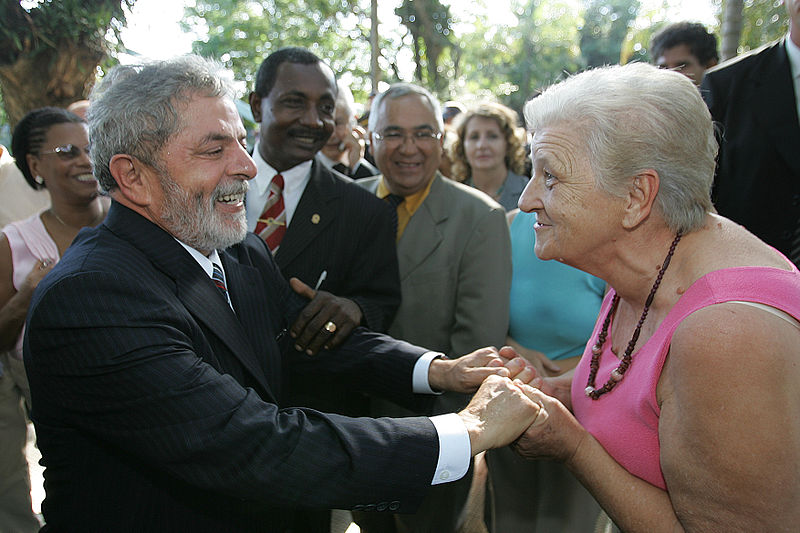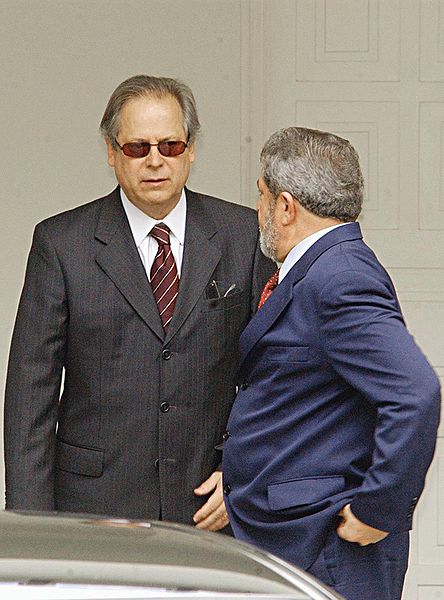Luiz Inácio Lula da Silva
By 2002, Fernando Henrique Cardoso?s Plano Real had curtailed inflation, but a number of problems still needed to be addressed. Most pressing in the economic sector were Brazil?s growth rate, which had slowed as a result of stagnation, and the large debts that the country had accrued. Real minimum wages were low, and the economic crisis had begun to deter foreign investment.
As Cardoso?s second term came to a close in 2002, several possible candidates were considered for his succession. While some candidates dropped out in response to scandals or joined the run shortly before the election, Luiz Inácio Lula da Silva remained a favorite in the polls throughout the race.
?One of us
Lula?s lead as the preferred presidential candidate provoked wild reactions. A metalworker with no schooling, Lula, unlike any other president in Brazilian history, came from the working class. His unpolished Portuguese, lack of formal education, and the socialist platform of the Workers? Party he represented scared many among the elite, while his charisma and humble background endeared him to many among lower and middle classes.
Born into poverty in a rural area in the northeastern state of Pernambuco, Lula?s family moved to São Paulo when he was a young child, and he spent his early years as a factory employee in the automobile industry. An active member in the workers? union in São Bernardo, located in the industrial belt around São Paulo, he eventually became president of the metalworkers? union and led a wave of strikes from 1978 to 1980. He participated in the founding of the Workers? Party (PT, Partido dos Trabalhadores), a left-wing political party created in the waning years of the dictatorship. After running unsuccessfully for the presidency in 1989, 1994, and 1998, Lula a new image as he prepared to make his fourth bid in 2002.
Lula struggled to shake the image of someone lacking experience in public administration. His Marxist views caused alarm among many who did not know what to expect if Lula were elected President of Brazil. How would he change economic policies? What would be his approach toward foreign policy and foreign investment in Brazil? How would he diminish the colossal Brazilian debt and increase investment in the country? The real question was, however, whether the Brazilian population was ready to vote for someone so similar to them. Despite all of these anxieties, Lula was elected in 2002 in the second-round of the election, garnering 52 million votes, or 61.3% of the total.
How Lula changed Brazilian Society
Lula enacted several significant changes in the Brazilian social sphere. Among the most notable was the socioeconomic program, Bolsa Família, or Family Stipend, which Lula created in 2003 during a period of increased economic stability. The Bolsa Família awards families in absolute poverty (per capita income of less than 70 reais or about 35 dollars a month) a small amount of money. For families with children that have a per capita income of less than 140 reais or 70 dollars a month, the program grants a small sum of money per child (up to three children) as long as they are vaccinated, stay in school, and do not engage in illegal child labor.1 Bolsa Família was derived from a previous program in the Cardoso administration called Bolsa Escola (School Stipend), which was then mergered with new programs from Lula?s Fome Zero (Zero Hunger) campaign that aimed to reduce short-term poverty and increase human capital.
As of 2010, 12.4 million households had enrolled in the program. According to the Fundação Getúlio Vargas, one sixth of Brazil?s strides in poverty reduction can be attributed to this program, which only costs 0.5% of Brazilian GDP. Bolsa Família is not perfect, however: there are a greater percentage of families enrolled from rural areas than urban ones, even though urban areas tend to have the most startling levels of poverty and have a harder time keeping children away from child labor. 2
Lula also managed to increase the minimum wage from R$200 to R$510 (100 dollars to 205 dollars) during his presidency. Furthermore, 13 million new jobs were created. Lula gave Brazilians a sense of hope and demonstrated the value in redistribution of income. 3
The Economy under Lula
When Lula ran for the presidency, he emphasized how different his government would be from that of Cardoso?s, attributing many of the country?s problems to the previous administration. As soon as he was elected, however, Lula decided to continue the International Monetary Fund (IMF) program signed in 2002 by Cardoso and his Minister of Finance Pedro Malan, shocking many PT leftists. Lula was surprisingly conservative and conventional for someone who had been elected with a socialist platform.
Throughout the Lula government, Brazil?s foreign trade record was strengthened and the trade surplus increased, two factors largely responsible for the alleviation of debt and economic growth. Economic growth rose from 1.9% to 5.2%, and Brazil?s trade surplus increased from $13.1 billion to $33.3 billion. With growing exports, Lula had the freedom to fight Brazil?s core poverty and invest in social programs.
Bribery and Corruption
In 2005, a scandal arose. Congressman Roberto Jefferson came forward and accused the PT of paying a number of congressional representatives with government funds to pass bills that otherwise would not have had majority support. They became known as the mensalão (or big monthly payment). A wave of accusations of substantial bribes and ?off the book? payments followed which received significant television coverage and seemed to point to the culpability of Lula?s chief aides. The president, however, denied any knowledge or involvement. While the scandals were detrimental to Lula?s popularity, the large increases in minimum wage and success of the Bolsa Familia program aided in his re-election in 2006. Da Silva defended himself in an August 2012 New York Times article:
“I do not believe there was a mensalão,? Mr. da Silva said, claiming that his party had no need to buy votes because it had already secured a majority in Congress through political allegiances. But he also said he would respect the high court?s ruling on the case.4
In 2012, the Supremo Tribunal Federal, the Brazilian Supreme Court, reviewed the accusations on a case-by-case basis and has convicted several government officials of illegal actions and involvement in the corruption scandals. Although prosecutors have attempted to a build case against Lula, none have been ruled credible by the court, and he remains unscathed by the scandal.
Dilma Rousseff
In 2009, Lula chose Dilma Rousseff, his Chief of Staff, as his favorite to succeed him in the upcoming 2010 presidential elections. During her campaign, Rousseff presented herself as an extension of the eight-year Lula government. Her campaign treated Cardoso?s as the ?previous government,? bashing it for its flaws, while praising Lula?s government for its good qualities and promising to continue his policies. Lula went on national television to openly support her while still president. As a result, he was fined several times for violating electoral regulations. 5
Lula?s Luck
Lula benefited a great deal from changes underway before his presidency, and also behavior not necessarily under his own control. There was a decrease in population growth, easing the burden of essential social services. Geologists found a huge new oil field deep in the ocean off the Brazilian coast, and ethanol production expanded. The world economy saw a booming market for primary products, allowing Brazil?s exports to grow. Lula also benefited from a certain stability created by the Cardoso government, with the Plano Real taming inflation while avoiding recession and the privatization of monopolies increasing the inflow of foreign capital.
Sources:
- “Lula Da Silva Will Continue to Openly Support Dilma’s Presidential Campaign.” MercoPress. <http://en.mercopress.com/2010/07/31/lula-da-silva-will-continue-to-openly-support-dilma-s-presidential-campaign>. (accessed 04 Nov 2012)
- “Brazil?s Bolsa Família: How to Get Children out of Jobs and into School.” July 2010. The Economist. Economist Newspaper. (Accessed 04 Nov. 2012)
- Kingstone, Steve. Feb 2010 “How President Lula Changed Brazil.” BBC News. BBC. <http://www.bbc.co.uk/news/world-latin-america-11458409>. (Accessed 04 Nov 2012)
- “Em Entrevista a Jornal, Lula Diz Que Não Crê Na Existência Do Mensalão.” Política – G1. Globo. <http://g1.globo.com/politica/noticia/2012/08/em-entrevista-jornal-lula-diz-que-nao-cre-na-existencia-do-mensalao.html>. (Accessed 04 Nov 2012)
- Romero, Simon. Aug 2012. “Brazil’s Ex-President Back on Front Lines.” The New York Times. The New York Times. <http://www.nytimes.com/2012/08/26/world/americas/brazils-ex-president-lula-back-on-political-front-lines.html?_r=0>. (Accessed 04 Nov 2012)
Footnotes:
1. Decree nº 5.209, de 17 de setembro de 2004 ? Regulates a Law-010.836-2004 ? Bolsa Família Program.
2. “Brazil?s Bolsa Família: How to Get Children out of Jobs and into School.” July 2010. The Economist. Economist Newspaper. (Accessed 04 Nov. 2012)
3. “Brazil?s Bolsa Família: How to Get Children out of Jobs and into School.” July 2010. The Economist. Economist Newspaper. (Accessed 04 Nov. 2012)
4. Romero, Simon. Aug 2012. “Brazil’s Ex-President Back on Front Lines.” The New York Times. The New York Times. (Accessed 04 Nov 2012)
5. “Lula Da Silva Will Continue to Openly Support Dilma’s Presidential Campaign.” MercoPress. (Accessed 04 Nov 2012)





